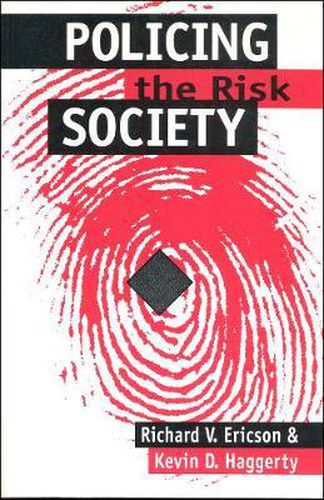Readings Newsletter
Become a Readings Member to make your shopping experience even easier.
Sign in or sign up for free!
You’re not far away from qualifying for FREE standard shipping within Australia
You’ve qualified for FREE standard shipping within Australia
The cart is loading…






The information age has left few of us untouched; individuals and institutions alike have undergone radical transformations in the race to get the most out of new technologies. The police are no exception. Policing the Risk Society introduces us to a shocking new vision of police work in which information gathered by the police with surveillance and data collection technologies is brokered to other institutions.Richard Ericson and Kevin Haggerty contend that the police have become information brokers to institutions, such as insurance companies and health and welfare organizations whose operations are based on a knowledge of risk. These institutions influence the ways in which police officers think and act. A critical review of existing research reveals the need to study police interaction with institutions as well as with individuals. These institutions are part of an emerging ‘risk society’ where knowledge of risk is used to control danger. The authors examine different aspects of police involvement: the use of surveillance technologies and the collection of data on securities, careers, and different social, ethnic, age, and gender groups. They conclude by looking at how police organizations have been forced to bureaucratize and to continually adapt rules, formats, and technologies of communication to meet external demands for knowledge of risk.With this book, Ericson and Haggerty revolutionize the study of policing and, for the first time, provide concrete evidence of the central tenets of risk society theory. Their work will have a major impact not only on scholars in criminology, social theory, and communications, but on policing as well.Awarded the 1998 Herbert Jacob Book Prize by its Committee of the Law and Society Association, University of Massachusetts.
$9.00 standard shipping within Australia
FREE standard shipping within Australia for orders over $100.00
Express & International shipping calculated at checkout
The information age has left few of us untouched; individuals and institutions alike have undergone radical transformations in the race to get the most out of new technologies. The police are no exception. Policing the Risk Society introduces us to a shocking new vision of police work in which information gathered by the police with surveillance and data collection technologies is brokered to other institutions.Richard Ericson and Kevin Haggerty contend that the police have become information brokers to institutions, such as insurance companies and health and welfare organizations whose operations are based on a knowledge of risk. These institutions influence the ways in which police officers think and act. A critical review of existing research reveals the need to study police interaction with institutions as well as with individuals. These institutions are part of an emerging ‘risk society’ where knowledge of risk is used to control danger. The authors examine different aspects of police involvement: the use of surveillance technologies and the collection of data on securities, careers, and different social, ethnic, age, and gender groups. They conclude by looking at how police organizations have been forced to bureaucratize and to continually adapt rules, formats, and technologies of communication to meet external demands for knowledge of risk.With this book, Ericson and Haggerty revolutionize the study of policing and, for the first time, provide concrete evidence of the central tenets of risk society theory. Their work will have a major impact not only on scholars in criminology, social theory, and communications, but on policing as well.Awarded the 1998 Herbert Jacob Book Prize by its Committee of the Law and Society Association, University of Massachusetts.